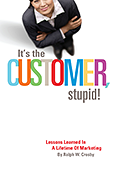The Customer Is Not Always Right
The retirement of my good friend and client at the DuPont Company, Thomas L. Sager, brought back memories of the way he approached business conflicts. The approach upsets the standard bromide that “the customer is always right.”
I believe the customer is king, but there is no divine right in that royalty.
What I’ve learned over the years is that customers’ wrongful or misguided acts require extraordinary action if you want to help your business, your employees, and your sanity. If you carry “The customer is always right” concept too far, it can come back to bite you. Here’s a joke that helps make the point:
Department store manager (chiding clerk): “What do you mean by arguing with that lady? Remember, the customer is always right!”
Clerk: “But she said we were swindlers!”
Sometimes, you may even have to fire a customer who is bad for business. Abrasive, unreasonable, or abusive customers demand whatever they want because they believe “The customer is always right,” and they can get away with it. It takes strong management to deal with these types. It’s tough to give up a customer, especially when it’s a major client or very profitable purchaser.
I don’t want to give the impression that firing complaining or unreasonable customers is your best or only alternative. It should be a last resort, not an early response. There are alternative ways to resolve disputes with customers. I learned how important this was from Tom Sager, then the DuPont Company’s General Counsel.
Often faced with legal battles with customers, suppliers, contractors, and joint venture partners, DuPont found that solving these battles with litigation was not only expensive and time-consuming, but negatively impacted some important business relationships.
So, DuPont Legal decided to emphasize Alternative Dispute Resolution (ADR) over litigation. ADR involves the use of mediation in appropriate cases and, at a higher level, arbitration, a more complex process based on contractual agreements. As Tom Sager told me, “ADR can often lead to the resolution of conflicts in a way that meets our business needs while minimizing legal costs and business relationship issues.”
I’m not suggesting that the average business would use such a legal process as ADR to resolve conflicts with customers. But the lesson of ADR is a simple one – when it comes to customers, try to make peace not war.
While customers’ wrongful or misguided acts shouldn’t be excused with the “always right” presumption, they shouldn’t immediately mean terminating the relationship. Finding alternative ways to resolve the conflict is in everybody’s best interests.

 Businesses often are started by entrepreneurs with an idea, a product or service, or an expertise. Many of them fail, not because the idea or product isn’t good, but because their attention is overwhelmingly directed internally – e.g., what goes into the product – when they should focus externally, always reminding themselves:
Businesses often are started by entrepreneurs with an idea, a product or service, or an expertise. Many of them fail, not because the idea or product isn’t good, but because their attention is overwhelmingly directed internally – e.g., what goes into the product – when they should focus externally, always reminding themselves:
